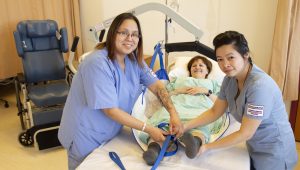Canada Sponsorship
Jobs Openings At Ohana Care Inc. – Banff, AB

Job Title: Health Care Aide
Location: Banff, AB
Shift: Morning, Night, Overnight
Wage: $20–$25 an hour
Ohana Care Health Services is looking for Health Care Aides who are actively registered with the Alberta HCA Directory, and a passion for providing seniors with outstanding care. The most important part of our work is to make our clients feel they’re cared for, and to build a trusting relationship.
We offer a range of home care services provided in the home, at assisted living facilities, and nursing homes around Calgary, Edmonton, Vancouver and the surrounding areas, 24- hours a day.
If you meet the below requirements, we’d love to hear from you.
Job Requirements:
- Health Care Aide Certificate, or relevant education
- Registered with Alberta HCA Directory
- Minimum of 1 years’ experience working with seniors.
- Valid Criminal Record Check (within the last 6 months).
- CPR (HCP) Certificate.
- Valid Alberta Drivers License and vehicle would be considered an asset (pay incentive provided)
Job Description:
- Work within your HCA scope within an interdisciplinary health care professional team
- Assist clients within both facilities and home-care settings
- Assist patients to take their medications.
- Assist with meals if at home, and portering residents to dining area at scheduled
- mealtimes as necessary in a facility setting.
- Assist with transfers, ambulation, and exercises
- Practice within your HCA scope; utilizing professional experience and judgement when
- providing care to residents.
- Detailed and concise communication with Ohana management
Personal Requirements
- Caring nature with a passion for senior’s care.
- Competent and confident in skills and abilities as a registered HCA
Schedule:
- 8 hour shift
Application question(s):
- What is your availability for shifts?
- Do you have a valid drivers license and access to a reliable vehicle?
Licence/Certification:
- Alberta HCA Directory number (required)
What skills and qualities are important for a Care aid?
Skills and qualities that are important for a Care Aide (also known as a Healthcare Aide or Nursing Assistant) include:
- Compassion and Empathy: Care Aides work closely with individuals who may be in vulnerable situations or experiencing health challenges. Having compassion and empathy allows Care Aides to provide emotional support, understand clients’ needs, and deliver care with kindness and sensitivity.
- Communication Skills: Effective communication is crucial in healthcare settings. Care Aides need to communicate clearly with clients, their families, and healthcare professionals. They must listen actively, understand instructions, and convey information accurately.
- Personal Care Skills: Care Aides assist clients with activities of daily living (ADLs) such as bathing, dressing, toileting, grooming, and feeding. Having proficiency in personal care tasks and techniques, as well as maintaining client dignity and privacy, is important.
- Observation and Reporting: Care Aides observe clients’ physical and emotional well-being, noting any changes or concerns. They must be attentive to detail, recognize signs of distress or improvement, and effectively report their observations to the appropriate healthcare professionals.
- Empathy and Patience: Care Aides often work with individuals who may have physical limitations, cognitive impairments, or chronic conditions. Being patient and understanding allows Care Aides to provide support at the client’s pace and adapt to their unique needs.
Each healthcare facility or organization may have specific requirements and additional skills relevant to their setting. It’s essential to review job postings, consult with employers or regulatory bodies, and stay updated on best practices and continuing education opportunities to enhance skills as a Care Aide.
What education and certification are required to become a Care aid?
Skills and qualities that are important for a Care Aide (also known as a Healthcare Aide or Nursing Assistant) include:
- Compassion and Empathy: Care Aides work closely with individuals who may be in vulnerable situations or experiencing health challenges. Having compassion and empathy allows Care Aides to provide emotional support, understand clients’ needs, and deliver care with kindness and sensitivity.
- Communication Skills: Effective communication is crucial in healthcare settings. Care Aides need to communicate clearly with clients, their families, and healthcare professionals. They must listen actively, understand instructions, and convey information accurately.
- Personal Care Skills: Care Aides assist clients with activities of daily living (ADLs) such as bathing, dressing, toileting, grooming, and feeding. Having proficiency in personal care tasks and techniques, as well as maintaining client dignity and privacy, is important.
- Observation and Reporting: Care Aides observe clients’ physical and emotional well-being, noting any changes or concerns. They must be attentive to detail, recognize signs of distress or improvement, and effectively report their observations to the appropriate healthcare professionals.
- Empathy and Patience: Care Aides often work with individuals who may have physical limitations, cognitive impairments, or chronic conditions. Being patient and understanding allows Care Aides to provide support at the client’s pace and adapt to their unique needs.
Each healthcare facility or organization may have specific requirements and additional skills relevant to their setting. It’s essential to review job postings, consult with employers or regulatory bodies, and stay updated on best practices and continuing education opportunities to enhance skills as a Care Aide.
Who can apply to this job?
The employer accepts applications from:
- Canadian citizens and permanent or temporary residents of Canada.
- Other candidates with or without a valid Canadian work permit.
How to apply
Online: Apply On Company WebSite
What is the work environment like for Care aid?
The work environment for Care Aides (also known as Healthcare Aides or Nursing Assistants) can vary depending on the setting in which they are employed. Here are some common work environments for Care Aides:
- Long-Term Care Facilities: Many Care Aides work in long-term care facilities, such as nursing homes, assisted living facilities, or residential care homes. In these settings, they provide care and assistance to individuals who require support with daily activities, such as bathing, dressing, toileting, grooming, and mobility. The work environment involves interacting with residents, collaborating with healthcare professionals, and following care plans to ensure the well-being and comfort of the residents.
- Hospitals: Care Aides are employed in hospitals and may work in various departments, including medical-surgical units, intensive care units, rehabilitation units, or geriatric wards. In hospitals, Care Aides assist patients with their personal care needs, provide comfort, help with mobility, and support patients in their recovery. The work environment can be fast-paced and demanding, with Care Aides working alongside nurses and other healthcare professionals as part of a larger team.
- Home Care: Some Care Aides work in clients’ homes, providing care and support to individuals who prefer to receive assistance in their own residences. In this setting, Care Aides visit clients and provide personal care, medication reminders, assistance with activities of daily living, light housekeeping, and companionship. The work environment for home care can vary greatly as it involves working directly with clients in their unique home settings.
- Community Support Programs: Care Aides may work in community-based programs that support individuals with disabilities, mental health challenges, or chronic conditions to live independently in the community. These programs provide personalized care and support to clients in their own homes or community centers. The work environment involves visiting clients, providing care and assistance as needed, and collaborating with other healthcare professionals and community resources.
- Hospice or Palliative Care: Care Aides may work in hospice or palliative care settings, providing comfort, support, and assistance to individuals who are nearing the end of life. These environments focus on creating a peaceful and compassionate atmosphere for patients and their families. Care Aides in hospice or palliative care settings provide personal care, pain management assistance, emotional support, and help with maintaining a comfortable environment.
The work environment for Care Aides can involve physical tasks, emotional challenges, and a need for flexibility in terms of work hours and client needs. Care Aides often work in shifts, including evenings, weekends, and holidays, to ensure continuous care for clients. The work can be rewarding as Care Aides have the opportunity to make a positive impact on the lives of individuals in need of care and support.
🔥Latest Job Vacancies in Canada (Updated Daily)
🇨🇦 Jobs in Canada with Sponsorship – Home Support Worker
Apply Now🇨🇦 Farm Worker Jobs with Sponsorship – Manitoba
Apply Now🇨🇦 Visa Sponsorship Jobs in Canada – Caregiver
Apply Now











